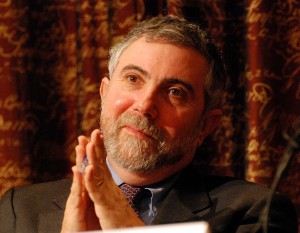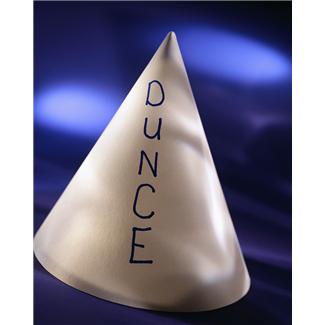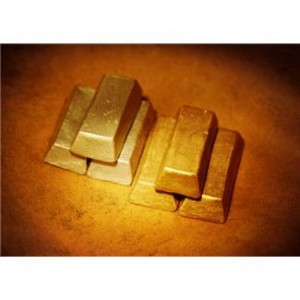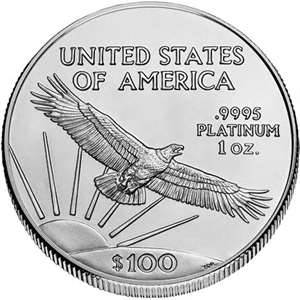Progressives truly don’t understand the difference between wealth and money
Paul Krugman is a Nobel Prize winning economist. He’s also remarkably ignorant (or stupid or, maybe, both). Only someone lacking in brains and understanding would think that the U.S. could get out of its debt problem, not by printing paper money, but by minting a platinum coin and then denominating it a “$1 trillion coin.” Nevertheless, that’s exactly what Krugman proposes. He thinks (probably wrongly, as it turns out) that there’s a Constitutional loophole that allows the president to “print” a trillion-dollar coin:
Enter the platinum coin. There’s a legal loophole allowing the Treasury to mint platinum coins in any denomination the secretary chooses. Yes, it was intended to allow commemorative collector’s items — but that’s not what the letter of the law says. And by minting a $1 trillion coin, then depositing it at the Fed, the Treasury could acquire enough cash to sidestep the debt ceiling — while doing no economic harm at all.
Did you get that last little bit? Magically creating a trillion dollars will do “no economic harm at all.” It’s worth exploring Krugman’s reasoning, to which he helpfully links (since he is, after all, judge, jury, and executioner when it comes to all thinks economic). I’ll quote him at length, because only then can one fully appreciate his reasoning:
In reality, to pursue the thought further, the coin really would be as much a Federal debt as the T-bills the Fed owns, since eventually Treasury would want to buy it back. So this is all a gimmick — but since the debt ceiling itself is crazy, allowing Congress to tell the president to spend money then tell him that he can’t raise the money he’s supposed to spend, there’s a pretty good case for using whatever gimmicks come to hand.
But leaving the debt ceiling on one side, isn’t it true that since spending can currently be financed by Fed money printing, we shouldn’t care at all about the notional debt owed to the Fed? Alas, no.
It’s true that printing money isn’t at all inflationary under current conditions — that is, with the economy depressed and interest rates up against the zero lower bound. But eventually these conditions will end. At that point, to prevent a sharp rise in inflation the Fed will want to pull back much of the monetary base it created in response to the crisis, which means selling off the Federal debt it bought. So even though right now that debt is just a claim by one more or less governmental agency on another governmental agency, it will eventually turn into debt held by the public.
What those three paragraphs circle around is the magic word: inflation. Krugman believes that magically pulling a trillion dollars out of the air won’t produce inflation but that, at some magical point in the future, President Obama will have borrowed so much money that he will be able to pay back the trillion dollars before inflation occurs. One suspects that Krugman is envisioning a scheme along the lines of check kiting, with Obama borrowing a trillion from the feds, so he can borrow a trillion from someone else, and then use that second trillion to pay back the first.
The fundamental flaw with Krugman’s whole theory, of course (which even he acknowledges is a “gimmick”), is that it ignores the difference between money, which merely a symbol of varying value, and wealth, which is the real measure of a healthy, rich economy. Apparently I need to give Krugman my “Economics 101” lecture, the same I used when my kids were nine to help explain to them the difference between money and wealth, and the concept of inflation. Here goes:
In the old days – the really old days – there was no money. Instead, there were goods. For example, you might have had wheat to spare, but you needed a cow. I, on the other hand, had a cow and but was short of wheat. The two of us were a match made in heaven, trading our goods to fulfill our desires.
Problems arose, of course, when I wanted the wheat, which you had, but you wanted a chicken, not a cow. Or perhaps you had wheat, but only a little, and certainly not worth enough to trade for an entire cow.
This old system also had a problem with mobility. It’s simply not feasible to carry bushels of wheat with you wherever you go, unless you have a really big purse. And cows are hard to lead into the pub in exchange for a nice pint o’ beer. Not to mention the fact that you’d need a lot of pints to equal one cow.
Something better needed to come along. And it did: Gold.
Gold’s a great substance. It’s beautiful; infinitely malleable; it blends well with other metals; it doesn’t degrade; and it can be replenished, although the effort needed to replenish it ensures the rarity that’s necessary to its value as a commodity.
The only downside to gold is that it’s heavy. Very, very heavy. Get enough gold together, and you’ve suddenly got the weight of that cow to carry around – and, once again, your purse isn’t big enough.
In all societies, some people, whether through trade, warfare, or outright theft, proved more adept at amassing wealth (whether wheat, cows, or gold) than others did, and they assumed leadership positions. Once in those positions, they tended to demand that their subordinates pay them protection money. These funds protected the hapless payor both from harassment by that same leader and from attacks launched by enemies outside the kingdom.
Eventually, this protection racket got formalized as taxes. Leaders also discovered that, in addition to providing protection for their subjects, there was a virtue in paying for basic services within the kingdom, such as roads, minimal care for the very poor, etc. A well-run kingdom increased everyone’s wealth.
But back to those grand clumps of heavy, heavy gold. Someone eventually got the idea that, rather than schlepping around gold, it would be a good idea to have currency made from lighter weight metals or even paper. These could be used to purchase myriad things that were worth less than a single gold coin and were easier to transport.
Because you couldn’t have random sheets of paper or chunks of silver or copper roaming around in the guise of currency, these money substitutes were useful only to the extent people believed them to be backed by the genuine gold article — and the only way to ensure that people could trust these substitutes was to delegate to a single entity the task of guarding the real gold and issuing the substitute coinage or paper. The entity that ended up responsible for holding the gold and backing the substitutes is government.
There are two important things to remember at this point: First, the substitute money’s worth is always relative to the gold. If the gold is finite, but you mint more coins or print more paper, each coin or note is worth less as it becomes a smaller fraction of the available gold. Put another way, imagine that over a six month period the government keeps printing notes until it has six times as many notes as it has gold. Milk that cost one piece of paper in January will cost six pieces of paper in June. The milk’s value in gold is the same; it’s the paper that became less valuable. (This, I helpfully explained to my kids, is inflation.)
Second, and this is the really important thing, one must remember that, nowadays, unlike the feudal lord of old who went and out ravaged another country to get gold, today’s governments doesn’t go out and amass gold; they just generate the coins and paper. To the extent the government has wealth, it’s because it uses its police power to demand that its citizens give it their wealth in the form of taxes. The government hasn’t created anything. In today’s America, as in all modern economies, only the people create wealth.
For Obama to mint a platinum coin does nothing to increase the country’s wealth. It’s just generating a piece of metal to which the Leftist government assigns an arbitrary value to justify taking on more debt that America cannot afford and cannot repay. For Paul Krugman to advocate this course of action isn’t just ignorant and stupid, it’s reckless to the point of national economic homicide. Too bad Krugman is incapable of feeling ashamed of himself.







